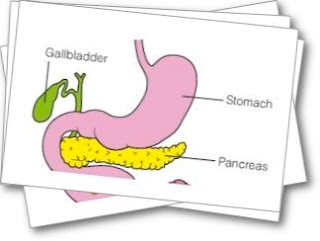Gallstones are small stones that form in your gallbladder. This is a little pouch that sits under your liver. It stores digestive juices that help your body break down food. Lots of people have gallstones.
In most people, gallstones don't cause any problems. But sometimes, they block the tubes that carry digestive juices. This can give you pain in your abdomen. And it can cause more serious problems, too, like swelling of your gallbladder.Your gallbladder is part of your digestive system.
How your gallbladder works
Your digestive system breaks down the food you eat so your body can use the nutrients.
Your gallbladder's job is to store bile. Bile is one of the digestive juices. Gall is the old name for bile.
Bile is a yellow-green liquid. It is made by your liver. It flows through tubes, also known as ducts, into your bowel. That's where it goes to work, helping to break down food.
Bile has lots of chemicals in it. One chemical is cholesterol. This is a fatty substance. Another chemical is called bile acid. It helps break down fat in the food you eat.
Your liver makes bile all the time. But it only goes into your bowel when you eat or drink. The rest of the time, it is stored in your gallbladder. This is a small, stretchy pouch that sits under your liver. Normally, your gallbladder holds about 6 teaspoons of bile.
When you eat or drink, your gallbladder squeezes bile out into a tube called the cystic duct. The bile flows down this tube into another one. That second tube is called the bile duct. It takes the bile to your bowel.
When your liver makes bile that is not needed right away, the bile flows up your cystic duct and into your gallbladder, for storage.
What happens when you have gallstones
Sometimes, when bile is stored in your gallbladder, it gets very thick. Then it can get crystals in it. Usually, the crystals are made of cholesterol from the bile. They can grow into gallstones
Gallstones can be as small as a grain of sand or as big as a golf ball. And you may have just one big gallstone or hundreds of small ones.
The symptoms and problems gallstones cause depend on where they gets stuck and how long they stay stuck.
Gallstones can hurt a lot when they block tubes. Usually, this isn't serious. But sometimes the blockage does cause serious problems like inflammation (swelling) in your gallbladder.
Women are almost twice as likely as men to have gallstones. This is because the female sex hormone (called estrogen) makes it easier for the stones to form.
Being obese (very overweight) increases your risk of getting gallstones, especially if you are a woman.
Self-care Measures
Avoid junk food completely
Avoid oily food
Cut down of carbohydratesDrink at least 8-10 glasses of water a day
Avoid junk food completely
Avoid oily food
Cut down of carbohydratesDrink at least 8-10 glasses of water a day
